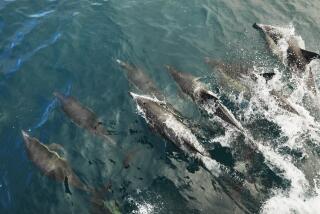Oceans
- Share via
They’re the cradle of life and a critical factor influencing the planet’s weather, yet many aspects of them are still a mystery. Oceans cover more than 71% of the earth, contain 95% of all the water and provide resources for food, medicine, energy and manufacturing. To learn more about oceans, use the direct links on the Times Launch Point Web site:
https://www.latimes.com/launchpoint
* Prepared by the UC Irvine department of education Level ONE
The TOPEX/Poseidon Kids Page: Scientists study the oceans to understand changes in climate. See how satellites take measurements of the oceans and see pictures of the El Nino phenomenon. Ask an oceanographer a question and try out an online coloring book.
https://www.tsgc.utexas.edu/tsgc/topex/kids
Bill Nye, the Science Guy: Ocean Currents: Find out how volcano eruptions made our oceans salty. Learn about the rivers of water called currents and try an experiment to find out if water can help animals stay warm.
https://nyelabs.kcts.org/nyeverse/episode/e29.htm
Victor the Vector: Read the tale of Victor the Vector and follow him on his journey as he learns about currents, waves, upwellings, ocean temperatures and more. Find out what happens as Victor encounters storms, icebergs and even kidnappers.
https://www.ocean98.org/vicin.htm
Level Two
Physical Oceanography From Space: Learn about the anatomy of a wave and find out about about the instruments oceanographers use to study the movements of the ocean. Read about Benjamin Franklin’s adventures as an oceanographer and his accurate assessments of the Gulf Stream.
https://podaac.jpl.nasa.gov/kids
1998-International Year of the Ocean Kids Page: The United Nations has declared 1998 to be the Year of the Ocean. Immerse yourself in an assortment of activities and resources, including suggestions for what you can do to save coral reefs.
https://www.yoto98.noaa.gov/kids.htm
Hot Air Over Hot Water: El Nino: All the fuss over El Nino started with warm ocean waters. Learn how warm water currents have led to all the umbrella days we experienced during the winter of 1997-98.
https://sln.fi.edu/weather/nino/nino.html
Level Three
Welcome to the Exploraquarium!: Here’s your chance for two virtual voyages. Explore the coastal shores of Puget Sound or take a trip to the bottom of the sea and learn about the unique world of deep-sea geysers and underwater volcanoes.
https://www.ocean.washington.edu/people/grads/scottv/exploraquarium
Ocean Planet from the Smithsonian: Ocean temperatures can range from 79 degrees in tropical waters to 30 degrees in polar regions. This extensive collection of resources details the amazing diversity of life underwater and reports recent discoveries.
https://seawifs.gsfc.nasa.gov/ocean_planet.html
Ocean 98: Find out the facts on a range of topics--from barnacles and the Bermuda Triangle to tsunamis, sunken treasure and marine science careers. Read about current events affecting the oceans and why our oceans need to be protected.
https://www.ocean98.org/ocean98.html
Launch Point is produced by the UC Irvine department of education, which reviews each site for appropriateness and quality. Even so, parents should supervise their children’s use of the Internet. This week’s column was designed by Terry Edinger, Anna Manring and Stan Woo-Sam.
Explorer’s Quest:
What ocean plants produce more than half the oxygen we breathe?
CLUE:
See Ocean 98, Ocean Facts and Statistics
https://www.ocean98.org/ocean98.html
Find What You Need to Know: Have a project on California history? Need help with a math problem? Launch Point covers more than 50 topics for getting your schoolwork done. Go to https://www.latimes.com/launchpoint for the full list of subjects and direct links to the best Internet sites.
Answer to last week’s Quest: The automatic traffic light.





